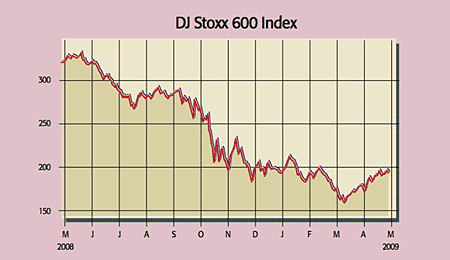Get the latest financial news, insights and expert analysis from our award-winning MoneyWeek team, to help you understand what really matters when it comes to your finances.
You are now subscribed
Your newsletter sign-up was successful
Want to add more newsletters?
Like most developed markets, the pan-European DJ Stoxx 600 index has rebounded smartly since mid-March, gaining around 22%. But as is the case elsewhere, the rally's days look numbered. The outlook for Europe is particularly grim. Last week a number of business surveys in the eurozone suggested that the pace of decline may be easing, but the downturn is far from over.
The continent's exporters, such as Germany, have been hit by slumping global demand. Some countries, notably Ireland and Spain, are grappling with imploding housing and credit bubbles. German GDP fell at an annualised rate of 13% in the first quarter, and authorities expect a 6% fall for the whole of 2009. Unemployment in Spain soared from 14% to 17.4% in the first quarter.
The International Monetary Fund (IMF) reckons Eurozone GDP will shrink by more than 4% this year, and could well keep contracting next year, compared with a 2.8% GDP decline in America in 2009 and zero growth next year.
Try 6 free issues of MoneyWeek today
Get unparalleled financial insight, analysis and expert opinion you can profit from.

Sign up to Money Morning
Don't miss the latest investment and personal finances news, market analysis, plus money-saving tips with our free twice-daily newsletter
Don't miss the latest investment and personal finances news, market analysis, plus money-saving tips with our free twice-daily newsletter

Even though this is set to be an especially unpleasant downturn, Stoxx 600 consensus earnings forecasts still "imply a short and mild" earnings recession, according to Morgan Stanley. In 2002/2003 forecasts fell by 60% from the peak; for 2009/2010, so far the downgrade has been just 40%-45%. And it's likely to get worse, say analysts at Landesbank Berlin. The sharp rebound of financial stocks looks unjustified, given that the sector faces "further problems".
That may be putting it mildly. Europe has "the biggest problem and has made the least progress" in the financial crisis, says Wolfgang Munchau in the FT. The IMF expects the fallout will create total bad assets of $2.8trn for the global banking system, with S1.4trn sitting in European banks, compared with $1.05trn in US ones. Eurozone banks have so far written down less than a fifth of their total expected losses; in America and Britain, the figures are around 50% and 33% respectively.
Eurozone banks may need another $375bn to bring their capital cushion back to pre-crisis levels, $100bn more than American peers. It will be some time before there is a solution to Europe's toxic asset problem. But until there is, says Saxo Bank, "we will not see a sustainable recovery in European equity markets".
Get the latest financial news, insights and expert analysis from our award-winning MoneyWeek team, to help you understand what really matters when it comes to your finances.
MoneyWeek is written by a team of experienced and award-winning journalists, plus expert columnists. As well as daily digital news and features, MoneyWeek also publishes a weekly magazine, covering investing and personal finance. From share tips, pensions, gold to practical investment tips - we provide a round-up to help you make money and keep it.
-
 What do rising oil prices mean for you?
What do rising oil prices mean for you?As conflict in the Middle East sparks an increase in the price of oil, will you see petrol and energy bills go up?
-
 Rachel Reeves's Spring Statement – live analysis and commentary
Rachel Reeves's Spring Statement – live analysis and commentaryChancellor Rachel Reeves will deliver her Spring Statement on 3 March. What can we expect in the speech?

